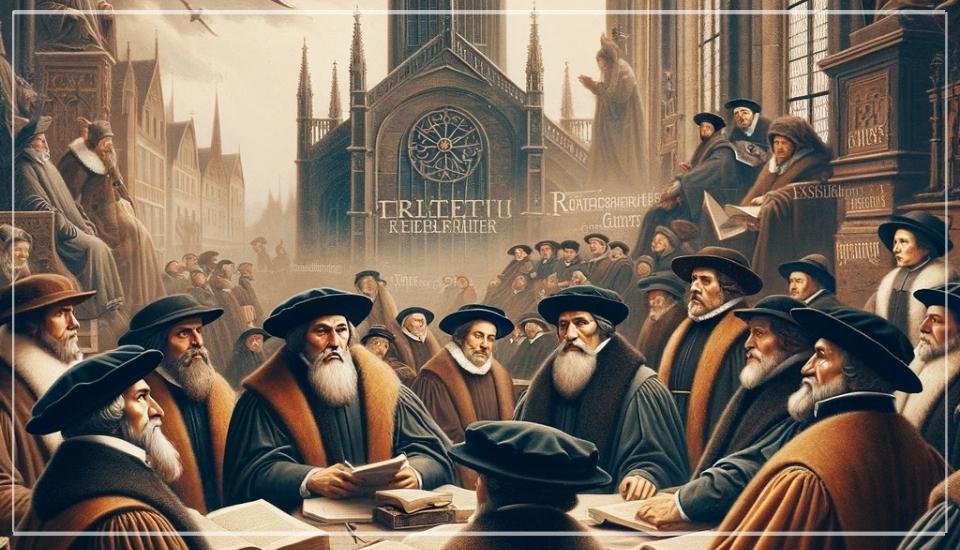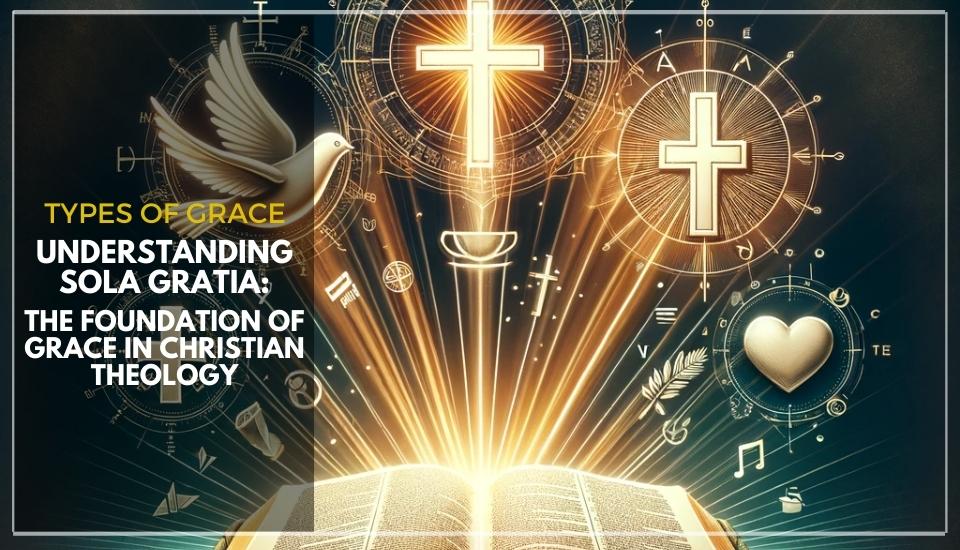What You’ll Learn
Dr. John’s Takeaways
- Sola Gratia Meaning: Emphasizes salvation through God’s grace alone, not human efforts.
- Reformation Impact: Central to the Protestant Reformation, championed by reformers like Martin Luther.
- Theological Core: Linked with sola fide (faith alone) and solus Christus (Christ alone), pivotal in Protestant beliefs.
- Scriptural Support: Rooted in scriptures like Ephesians 2:8-9, highlighting salvation as a divine gift.
- Church Influence: Shapes practices in Lutheran and other Protestant denominations.
- Salvation Dynamics: Focuses on the salvation of sinners by grace, involving the Holy Spirit.
- Triune God’s Role: Emphasizes the comprehensive work of the Triune God in salvation.
- Practical Impact: Guides believers in living a life of faith, underlining the richness of divine grace.
- Ecumenical Relevance: Continues to influence dialogues between different Christian traditions.
- I’ve put more insights below to expand on the topic, feel free to continue reading 🙂
What Is The Meaning Of Sola Gratia?
Sola gratia, a Latin phrase, means “grace alone”. it’s a central doctrine in Christian theology, particularly within Protestantism. This concept emphasizes that salvation is a gift from God, granted not through human efforts or merits but purely through His grace.
Origin And Usage Of The Term
The term “sola gratia” emerged during the Protestant Reformation, a significant movement in the 16th century led by figures like Martin Luther. It was a response to the prevailing beliefs of the time, particularly those of the Roman Catholic Church, which combined faith, sacraments, and good works as means to salvation.
- Reformer’s View: Reformers like Luther argued that salvation is a gift of God, not a result of human works.
- Latin Influence: The phrase’s Latin origin reflects its historical and theological depth, connecting it to the church’s ancient roots.
How Sola Gratia Relates To Salvation
In Christian belief, sola gratia means that salvation is a type of grace: divine grace. It’s not earned by good deeds, religious rituals, or any human effort.
- Unmerited Favor: This concept sees God’s grace as an unmerited favor. Humans are sinners and cannot earn salvation.
- Grace vs. Works: It stands in contrast to beliefs that good works or church practices can lead to salvation.
Key Principles Of Sola Gratia In Christian Theology
Sola gratia is more than just a doctrine; it’s a foundational principle that shapes various aspects of Christian faith and practice.
- Grace and Faith: While sola gratia focuses on grace, it is often linked with sola fide (faith alone), another key Reformation doctrine.
- Scriptural Basis: Key biblical texts supporting this doctrine include passages like Ephesians 2:8-9, underscoring salvation as a gift of God, not a result of works.
Comparing Sola Gratia With Other Theological Concepts
Sola gratia is part of the broader framework of Christian doctrines, often compared and contrasted with other key concepts.
- Sola Scriptura: This principle, meaning scripture alone, complements sola gratia, emphasizing the Bible’s authority in understanding salvation.
- Sola Fide and Solus Christus: These doctrines, meaning faith alone and Christ alone, respectively, intertwine with sola gratia, forming a comprehensive view of salvation in Protestant thought.
| Concept | Description |
|---|---|
| Sola Gratia | Salvation through grace alone |
| Sola Fide | Salvation through faith alone |
| Solus Christus | Salvation through Christ alone |
| Sola Scriptura | Authority of scripture alone |
| Soli Deo Gloria | Glory to God alone |
Sola gratia is a transformative and central doctrine in Christianity, especially within Protestant traditions, highlighting the role of God’s grace in the salvation of humankind.
How Does Sola Gratia Connect With Salvation?

Sola gratia, or grace alone, is a key pillar in understanding Christian salvation. It asserts that salvation is a result of God’s grace, independent of human efforts or deeds.
The Concept Of Grace Alone In Salvation
Sola gratia teaches that God’s grace is the sole cause of salvation. It’s not something one can earn or merit through good works or personal virtues. This belief profoundly shapes the Christian understanding of salvation, emphasizing its nature as a gift of God.
- Divine Initiative: Salvation begins and ends with God. It’s His initiative and gift to humanity.
- Grace vs. Human Effort: This doctrine clearly states that human efforts cannot achieve salvation. It’s by grace you have been saved.
Sola Gratia And The Role Of Faith In Salvation
While sola gratia emphasizes grace, it closely ties with sola fide, or faith alone. This bond highlights that faith is the means through which believers receive God’s grace.
- Faith as a Response: Faith is understood not as a work, but as a trustful response to God’s grace.
- Relationship between Grace and Faith: Grace is the foundation, and faith is the means of receiving salvation.
Unmerited Favor And Its Significance In Salvation
The concept of God’s unmerited favor is central to sola gratia. It means that salvation is not a reward for good behavior or religious adherence but is given out of God’s love and mercy.
- What is Grace: Grace is inherently unmerited; humans are sinners saved by grace, not by their righteousness.
- Implications for Believers: This leads to a humble acknowledgment of one’s dependence on God for salvation.
Biblical References And Support For Sola Gratia
Sola gratia is deeply rooted in scripture, with numerous passages supporting the concept of grace alone in salvation.
- Ephesians 2:8-9: A key verse highlighting that salvation is a gift, not a result of works.
- Romans: Paul’s letters, especially to the Romans, extensively discuss grace and justification by faith.
Impacts On Individual Christian Beliefs And Practices
Understanding sola gratia has significant implications for individual believers and their spiritual lives.
- Transformation of Attitude: It fosters a sense of humility and gratitude towards God.
- Daily Living: This belief affects how Christians view their actions, driving them towards grateful service rather than earning salvation.
| Implication | Description |
|---|---|
| Humility | Recognizing salvation is not earned, but a gift |
| Gratitude | Thankfulness for God’s grace |
| Service | Motivation to serve out of gratitude, not obligation |
Sola gratia, by emphasizing salvation as a gift of grace, profoundly affects both the theological understanding and the practical living of the Christian faith.
What Is The Historical Significance Of Sola Gratia In Reformation?

The doctrine of sola gratia played a crucial role in the Protestant Reformation, a pivotal movement that reshaped Christian theology and practice in the 16th century.
Sola Gratia As A Pillar Of The Protestant Reformation
Sola gratia emerged as a foundational principle of the Reformation, challenging the then-prevailing views on salvation.
- Shift in Doctrine: It marked a significant shift from the Roman Catholic emphasis on sacraments and good works for salvation.
- Core Reformation Theme: Sola gratia became a rallying cry for Protestants, emphasizing God’s grace as the sole means of salvation.
Martin Luther’s Contribution To The Doctrine Of Sola Gratia
Martin Luther, a key reformer, was instrumental in popularizing sola gratia.
- Against Church Practices: Luther opposed the Church’s practices like indulgences, advocating salvation through grace alone.
- Spread of the Doctrine: His teachings, including his translation of the Bible, helped spread the concept of sola gratia widely.
Comparison Of Sola Gratia With Other Reformation Doctrines
Sola gratia is one of the Five Solas, a set of principles central to Protestant theology.
- Sola Scriptura: Scripture alone as the religious authority.
- Sola Fide: Faith alone as the means to receive grace.
- Solus Christus and Soli Deo Gloria: Christ alone for salvation and glory to God alone.
Conflict With The Roman Catholic Church And Doctrinal Differences
The emergence of sola gratia led to significant doctrinal conflicts with the Roman Catholic Church.
- Nature of Salvation: A key point of contention was the Church’s teaching on faith, works, and sacraments in salvation.
- Reformation’s Ripple Effect: This conflict led to widespread religious changes and the birth of various Protestant denominations.
Legacy Of Sola Gratia In Contemporary Christian Traditions
Sola gratia continues to influence modern Christian thought and denominational beliefs.
- Lutheran and Reformed Traditions: These groups maintain a strong adherence to the doctrine.
- Ecumenical Dialogues: Discussions between Protestant and Catholic churches often revolve around understanding grace and salvation.
| Tradition | View on Sola Gratia |
|---|---|
| Lutheran | Central, as taught by Luther |
| Reformed | Integral to understanding salvation |
| Roman Catholic | Different emphasis, but acknowledges grace |
Sola gratia’s historical significance lies in its role as a catalyst for the Protestant Reformation and its enduring impact on Christian theology and denominational beliefs.
If You Want Results-Focused Consulting or an Unforgettable Speaker, Inquire About Booking Dr. Jackson Today.
How Does Sola Gratia Affect The Understanding Of Salvation And Sinners?
Sola gratia fundamentally shapes Christian perspectives on salvation and the nature of sinners, emphasizing that salvation is a divine gift and not a result of human effort.
The Role Of Grace Alone In The Salvation Of Sinners
Sola gratia underscores the belief that all humans are sinners and salvation is an act of God’s mercy.
- Divine Initiative: It is God who initiates salvation, reaching out to humanity in their sinful state.
- Unmerited Favor: Humans, as sinners, cannot earn salvation; it’s a gift given despite our unworthiness.
Sola Gratia And The Concept Of Unmerited Favor For Sinners
The doctrine stresses that God’s grace is given freely, like free grace, without regard for merit or worthiness.
- Grace Over Works: Good deeds or religious observance do not earn salvation; it’s solely a result of God’s grace.
- Transformative Impact: This understanding fosters humility and gratitude among believers.
Addressing Misconceptions About Salvation And Human Efforts
Sola gratia helps clarify common misunderstandings about the relationship between human actions and salvation.
- Not License to Sin: While salvation is not earned by works, this does not encourage sinful living.
- Faith and Works: Good works are seen as a response to, not a condition for, receiving grace.
The Interplay Between Sola Gratia And The Condition Of The Human Soul
This doctrine deeply influences how Christians view the human condition and spiritual transformation.
- Dependence on Grace: Recognizes human inability to achieve righteousness on their own.
- Spiritual Rebirth: Emphasizes the need for divine intervention for true spiritual change.
Practical Implications For Believers And Their Relationship With God
Understanding sola gratia has profound practical implications for individual believers in their daily walk with God.
- Humility and Dependence: Encourages a posture of humility and reliance on God.
- Living in Grace: Shapes how believers view their actions, motivations, and spiritual growth.
| Aspect | Impact of Sola Gratia |
|---|---|
| View of Self | Recognizing one’s sinfulness and need for grace |
| View of God | Understanding God’s mercy and love in offering salvation |
| Daily Living | Motivated by gratitude, not an attempt to earn favor |
Sola gratia offers a profound and transformative understanding of salvation, sin, and the believer’s relationship with God, emphasizing that salvation is entirely a gift of God’s grace, not something earned or deserved.
Grace Ambassador: Bringing Heaven To Earth
As believers, we have received unimaginable grace from the Father. Unfortunately, we often separate our spiritual life from our everyday lives. We fail to value the grace given to us, and we miss the opportunity to bring heaven to earth. Then we wonder what light we can bring to a world in deep darkness.




